
-
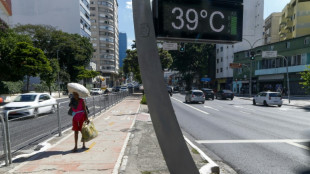 Brazil says 2024 was its hottest year on record
Brazil says 2024 was its hottest year on record
-
Soldier in Vegas Tesla blast suffered PTSD, no 'terror' link: FBI

-
 Lake Placid chosen as Olympic venue super sub if gamble on Cortina backfires
Lake Placid chosen as Olympic venue super sub if gamble on Cortina backfires
-
'Luke the Nuke' still living his teenage darts dream

-
 MLB Dodgers agree to terms with South Korean infielder Kim
MLB Dodgers agree to terms with South Korean infielder Kim
-
Bellingham grabs Real Madrid late Valencia win after Vinicius red

-
 US Olympian Kerley facing charges after clash with Miami Beach police
US Olympian Kerley facing charges after clash with Miami Beach police
-
Teenage sensation Littler storms to world darts title

-
 Judge to sentence Trump before inauguration in hush money case
Judge to sentence Trump before inauguration in hush money case
-
Microsoft expects to spend $80 bn on AI this fiscal year

-
 AC Milan rally past Juventus to meet Inter in Italian SuperCup final
AC Milan rally past Juventus to meet Inter in Italian SuperCup final
-
Trump-backed Republican Johnson elected speaker of US House

-
 Gaza rescuers say about 30 killed as truce talks resume
Gaza rescuers say about 30 killed as truce talks resume
-
UK, Germany electricity cleanest on record in 2024

-
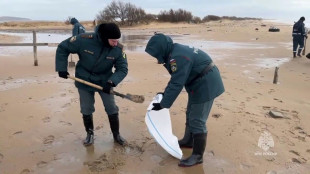 Oil from Russian tanker spill reaches Sevastopol
Oil from Russian tanker spill reaches Sevastopol
-
Man arrested for supplying drugs to Liam Payne: Argentine police

-
 US House rejects Trump-backed speaker in first ballot
US House rejects Trump-backed speaker in first ballot
-
European ministers urge inclusive transition on Syria visit

-
 Rickelton hits Test best as South Africa on top against Pakistan
Rickelton hits Test best as South Africa on top against Pakistan
-
Lebanon minister says working to 'resolve' Syria's new entry restrictions

-
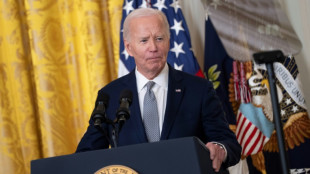 US announces $306 mn in new bird flu funding
US announces $306 mn in new bird flu funding
-
Salah targets Premier League glory in 'last year' at Liverpool

-
 Rockets fired from Gaza as Israeli strikes kill 16, rescuers say
Rockets fired from Gaza as Israeli strikes kill 16, rescuers say
-
Marseille coach De Zerbi defends 'strong' Ligue 1

-
 Rickelton, Bavuma tons put South Africa in strong position
Rickelton, Bavuma tons put South Africa in strong position
-
Breeding success: London zoo counts its animals one-by-one
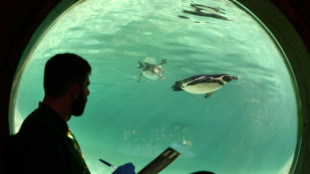
-
 Fofana could miss rest of Chelsea's season
Fofana could miss rest of Chelsea's season
-
Republican speaker, Trump face test in Congress leadership fight

-
 Man Utd 'starving for leaders' ahead of Liverpool clash: Amorim
Man Utd 'starving for leaders' ahead of Liverpool clash: Amorim
-
Alcohol should have cancer warning label: US surgeon general
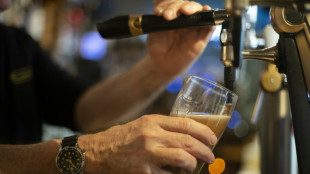
-
 Biden blocks US Steel sale to Japan's Nippon Steel
Biden blocks US Steel sale to Japan's Nippon Steel
-
Wall Street stocks bounce higher, Europe retreats

-
 Neil Young says he will play Glastonbury after all
Neil Young says he will play Glastonbury after all
-
Frenchman Castera plots roadmap for Dakar success

-
 Doha hosts PSG clash with Monaco in French Champions Trophy
Doha hosts PSG clash with Monaco in French Champions Trophy
-
Hamilton 'excited for year ahead' after Ferrari switch

-
 Man City must 'think' about De Bruyne future: Guardiola
Man City must 'think' about De Bruyne future: Guardiola
-
Biden blocks US-Japan steel deal

-
 French police to face trial for 'suffocating' death
French police to face trial for 'suffocating' death
-
British novelist David Lodge dies aged 89

-
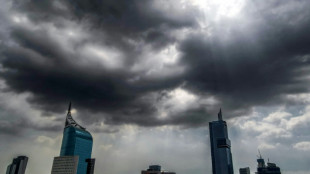 Indonesia says 2024 was hottest year on record
Indonesia says 2024 was hottest year on record
-
South African Lategan wins Dakar Rally prologue

-
 Barca coach Flick optimistic but 'not happy' over Olmo situation
Barca coach Flick optimistic but 'not happy' over Olmo situation
-
Djokovic Australian Open preparations take hit with loss to Opelka

-
 Indian duo self-immolate in Bhopal waste protest
Indian duo self-immolate in Bhopal waste protest
-
Indian food delivery app rolls out ambulance service

-
 Arsenal must 'flip coin' in Premier League title race, says Arteta
Arsenal must 'flip coin' in Premier League title race, says Arteta
-
European stock markets retreat after positive start to year

-
 World food prices dip 2% in 2024: FAO
World food prices dip 2% in 2024: FAO
-
The horror of Saydnaya jail, symbol of Assad excesses


Ocalan: PKK chief held in solitary on Turkish prison island
Abdullah Ocalan, the jailed founder of Kurdish militant group the PKK is hailed by many Kurds as an icon, but within wider Turkish society many see him as a terrorist who deserves to die.
On Saturday, Ocalan, who has been held in solitary confinement in Turkey since 1999, received his first political visit in nearly a decade amid signs of a tentative thaw in relations with the Turkish government.
The move came two months after the leader of the far-right MHP, a close ally of President Recep Tayyip Erdogan, offered Ocalan an unprecedented olive branch if he would publicly renounce terror.
In a message sent back with his visitors, two lawmakers from the pro-Kurd opposition DEM party, Ocalan -- the man who embodies the decades-long Kurdish rebellion against the Turkish government -- said he was "ready" to embrace efforts to end the conflict.
"I am ready to take the necessary positive steps and make the call," said the 75-year-old former guerrilla, who also received his first family visit in four years on October 23.
During that visit, Ocalan said he had the necessary clout to shift the Kurdish question "from an arena of conflict and violence to one of law and politics".
Ankara's tentative bid to reopen dialogue nearly a decade after peace efforts collapsed comes amid a major regional adjustment following the ouster of Syria's Bashar al-Assad.
- PKK: a Marxist-inspired group -
Ocalan founded the PKK -- the Kurdistan Workers' Party -- in 1978. It spearheaded a brutal insurgency that has killed tens of thousands in its fight for independence and, more recently, broader autonomy in Turkey's mostly Kurdish southeast.
A Marxist-inspired group, the PKK is considered a terror organisation by Turkey, the United States, the European Union and most of Turkey's Western allies.
After years on the run, Ocalan was arrested on February 15, 1999 in Kenya following a Hollywood-style operation by Turkish security forces.
He was sentenced to death, but escaped the gallows when Turkey abolished capital punishment in 2004. He has since been held in an isolation cell on Imrali island in the Sea of Marmara.
For many Kurds, he is hero they call "Apo" (uncle). But Turks often call him "bebek katili" (baby killer) for his ruthless tactics, including the bombing of civilian targets.
- Involvement in peace talks -
Tentative moves to resolve Turkey's "Kurdish problem" began in 2008. Several years later, Ocalan got involved in the first unofficial peace talks, approved when Erdogan was premier.
Seen as the world's largest stateless people, Kurds were left without a country when the Ottoman Empire collapsed after World War I.
Although most live in Turkey, where they make up around a fifth of the population, the Kurds are also spread across Syria, Iraq and Iran.
For hardline nationalists who support the post-Ottoman idea of "Turkishness", the Kurds simply do not exist.
And not all Kurds back the ideas, let alone the methods, of the PKK.
Led by Hakan Fidan, Erdogan's spy chief turned foreign minister, the talks raised hopes of ending the insurgency in favour of an equitable solution for Kurdish rights within Turkey's borders.
But they collapsed in July 2015, reigniting one of the deadliest chapters in the conflict.
After a suicide attack on pro-Kurdish demonstrators attributed to Islamic State (IS) group jihadists in October 2015, the PKK accused Ankara of collaborating with IS and resumed its violence with a vengeance.
Turkey's widescale use of combat drones has pushed most Kurdish fighters into Iraq and Syria, where Ankara has continued raids.
The government has defended its de facto silencing of Ocalan by saying he failed to convince the PKK of the need for peace, raising doubts about how much sway he has over the group.
- Captured in exile -
Ocalan was born on April 4, 1948, one of six siblings in a mixed Turkish-Kurdish peasant family in Omerli village, in Turkey's southeast. His mother tongue is Turkish.
He became a left-wing activist while studying politics at university in Ankara, and did his first stint in prison in 1972.
He set up the PKK six years later, then spent years on the run, launching the movement's armed struggle in 1984.
Taking refuge in Syria, he led the fight from there, causing friction between Damascus and Ankara.
Forced out in 1998 and with the net closing in, Ocalan raced from Russia to Italy to Greece in search of a haven, ending up at the Greek consulate in Kenya, where US agents got wind of his presence and tipped off ally Ankara.
Lured into a vehicle and told he would be flown to the Netherlands, Ocalan was instead handed over to Turkish military commandos and flown home on a private plane to face trial.
F.Ramirez--AT
